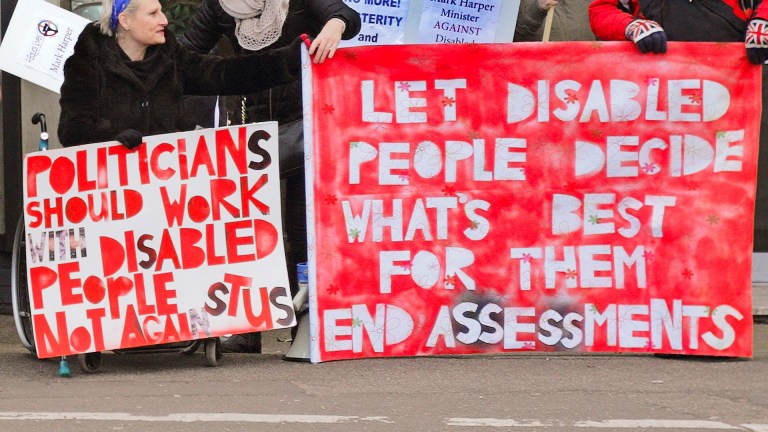“I had long-term mental health issues,” he says. “I was already receiving some therapy and medication. I had a lower reserve, if you like, for when trauma happened. It meant that I could get some leeway from creditors, but it also meant that on some days, I just didn’t want to open the letters or make phone calls. It was a perfect storm.”
The Big Issue previously reported on research from the Money and Mental Health Institute which found half of people facing debt have had suicidal thoughts in the cost of living crisis.
Around 2.5 million people feel “harassed” by the calls, texts and messages they receive from creditors.
Davensac, who is based in Essex, applied for more than 300 jobs during lockdown and was offered one in public services, but he failed the security test because of his financial situation. “I felt like I was teetering on the edge and, on top of this, the process was invasive and stressful,” he says.
He wasn’t eligible for furlough because he had lost his job ahead of lockdown. The pandemic also meant companies, including creditors, had to adjust to remote working, increased demand and staff shortages.
“A lot of them just weren’t prepared for what came along and how to handle it,” Devensac says. “You’d get some quite abrupt people lacking in sympathy, just demanding to know when they could see some repayments and you really felt like they weren’t listening.
“As my mental health declined, I did get quite stroppy with people which I knew wasn’t helping the situation. I was just in disbelief that they could treat people like this. My big worry was, how do people who aren’t as able and resilient deal with these things?”
Davensac received letters with advice on getting help for debt from lenders, which he says were often poorly photocopied and grey, but it was through reading this that he discovered StepChange.
He filled out the online questionnaire on StepChange’s website which directed him to recommendations as to his next steps. He was given letter templates to write to his credit card companies and lenders, and he got payment holidays as a result.
Davensac then got onto the government’s Breathing Space debt respite scheme, which gives people in debt temporary protection for up to 60 days during which creditors cannot contact you about debts or add any interest.
Citizens Advice helped him fill out forms, which had become overwhelming. An adviser spent an hour and a half on the phone with him talking him through the form line by line.
He also received help through StepChange’s Covid Payment Plan, which was a 12-month reduced payment plan for people impacted by the pandemic. “That was a real relief,” he says. “It meant they couldn’t hassle me during those 12 months. I paid one payment to StepChange and they then distributed it to all of my lenders, which was so helpful.”
Davensac remained unable to work because of his health. He once again went back to the charity and they recommended a debt relief order. There is a strict eligibility criteria, such as not having more than £75 left after paying your household bills, but it can help people write off their debts.
The debt relief order essentially means you stop making payments and follow certain rules for a year, after which the debt is written off.
Simon Trevethick, head of communications at StepChange, said: “If you find yourself in a position like David’s, the best time to seek help is now. Debt is nothing to be ashamed of and it is important to say that there is support out there for you. The rising cost of living does not discriminate and people right across Britain are facing the squeeze as rents rise, mortgage costs increase, and the price of everyday essentials grows.
“Getting free debt advice will involve an expert looking at your finances, with a recommendation of how to get back on track. You’ll set up a full monthly budget and you will be advised on the most sustainable way forward to deal with your debts. Taking that first step can be difficult, but it doesn’t have to be – your debt advice journey with StepChange can be done entirely online, is free and independent, and without judgement.”
Davensac is still facing mental health struggles. He relies on his partner’s income, which means he is not eligible for universal credit, but he receives disability benefits which means they can just about manage their bills.
He plans meals six weeks in advance and shops at different supermarkets to find the cheapest options. He has had to get used to a change of lifestyle, exacerbated by the cost of living crisis, but he has escaped the dark cycle of debt.
Now, he is debt free and he wants to smash stigma and give people the courage to find support.
“There’s this whole male pride thing,” he says. “You’ve got to set aside your male pride and your embarrassment in having to ask for help, because once you’ve got through to the right people like StepChange or Citizens Advice, they couldn’t have done more for me.”
Davensac wants to remind people that there is hope, if you make that first step in asking for help. “However bad your situation is, you can get out of it,” he adds. “I never thought I would get out of it. I had £50,000 worth of debt and in 18 months, I was debt free.”
Do you have a story to tell or opinions to share about this? We want to hear from you. Get in touch and tell us more.
Where to get help if you are struggling with debt and mental health
Call Samaritans for free on 116 123, email jo@samaritans.org or visit www.samaritans.org for useful resources and advice on coping if you are struggling with your mental health.
StepChange provides confidential and free expert advice on debt, as well as tips on budgeting, financial advice, and ways to prioritise your debts.
Citizens Advice provides help to deal with problem debt, to avoid losing your home and to get back on top of your finances.
Money Advice Trust operates a confidential national debtline which is available over the phone or via webchat.
Mental Health & Money Advice provides practical tips to lessen the strain of the financial crisis and maintain your mental wellbeing.
MoneyHelper offers guidance to help you through the often-stressful situation of talking to a creditor about money you owe them, how to navigate credit and Buy Now Pay Later agreements, and other money concerns.
Find out more about getting help for debt here and for coping with mental health in the cost of living crisis here.









